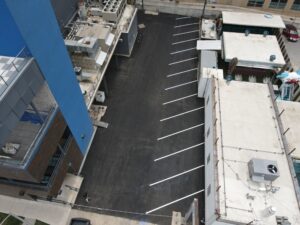 An asphalt pavement can be an ideal choice for many commercial and residential applications. Asphalt is economical, quick to install, and easy to maintain, and it can have a long life with proper care. One question that customers who are considering asphalt paving often ask is how thick the asphalt should be. The answer is that it primarily depends on three critical factors. These are the soil at your site, the expected traffic, and the inclusion or exclusion of an aggregate base.
An asphalt pavement can be an ideal choice for many commercial and residential applications. Asphalt is economical, quick to install, and easy to maintain, and it can have a long life with proper care. One question that customers who are considering asphalt paving often ask is how thick the asphalt should be. The answer is that it primarily depends on three critical factors. These are the soil at your site, the expected traffic, and the inclusion or exclusion of an aggregate base.
Table of Contents
ToggleHow Does the Underlying Soil Affect the Thickness of Asphalt Paving?
Asphalt pavements require a stable, strong foundation to remain flexible and resilient. Therefore, Dallas asphalt paving contractors must be able to compact the underlying soil sufficiently. If adequate compaction is impossible to achieve, your paving contractor may recommend installing an aggregate base. The incorporation of an aggregate base may reduce the thickness of the asphalt courses.
How Does Traffic Affect the Desired Thickness of Asphalt for Commercial Paving?
A commercial asphalt paving company will pay special attention to three traffic-related factors. These are the number of vehicles that you expect to use your pavement, their weights, and their turnover rate. For example, parking lot paving contractors will want to know how many vehicles the lot will serve each day. They will also want to know the weights of the vehicles using the lot. That is, will the lot serve passenger cars only, or will traffic consist of both cars and heavy trucks? The last traffic-related question is how long vehicles tend to remain stationary. Vehicles in an employee parking lot may remain stationary for eight or nine hours. However, the turnover rate at a convenience store could be less than five minutes.
How Does an Aggregate Base Affect the Thickness of Asphalt Paving?
Typically, an asphalt paving company considers every three inches of compacted aggregate as equivalent to one inch of asphalt. To illustrate, suppose a paving contractor recommends an asphalt thickness of three inches with an aggregate base of six inches. Without an aggregate base, the asphalt would need to be five inches thick.
What Are Some Specific Examples of Asphalt Thickness for Various Projects?
Now that you understand the various factors that can influence asphalt thickness, it is time to provide some general estimates. Keep in mind that the following estimates are generic, so your paving contractor may have different recommendations for your project.
• Residential driveways need an aggregate base of six to eight inches with an asphalt thickness of at least three inches.
• Commercial parking lots that support a high volume of mixed vehicles need an aggregate base of seven to eight inches. Depending on other factors, the thickness of the asphalt should be between four and six inches.
• Pavements around loading docks, truck scales, and dumpsters usually need special attention. Most contractors recommend five to seven inches of asphalt over an aggregate base of six to eight inches.
If you have additional questions about asphalt paving, contact the experts at HI-TEK Paving. We provide clients throughout the Dallas-Fort Worth metroplex with a wide range of paving services, including asphalt repair and paving, asphalt overlays, concrete installation, asphalt crack repair, sealcoating, parking lot striping, and concrete repair and installation. We have an exemplary reputation for remarkable craftsmanship, superior customer service, and professionalism. To request a free quote, you can fill out the online form, call 214-908-9641, or email Info@HI-TEKPavingDallas.com.
